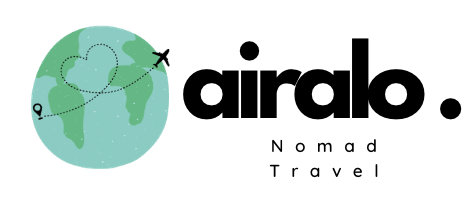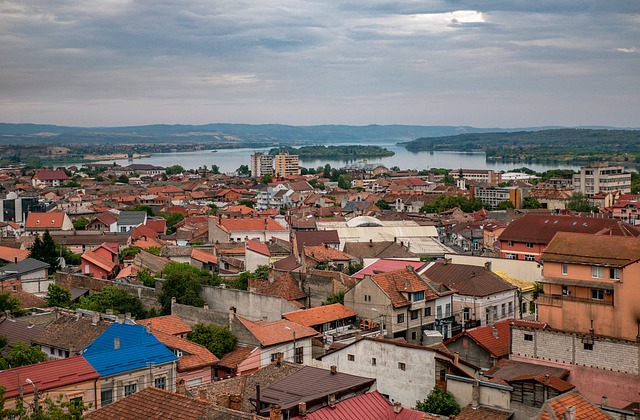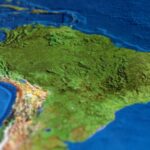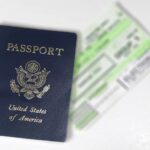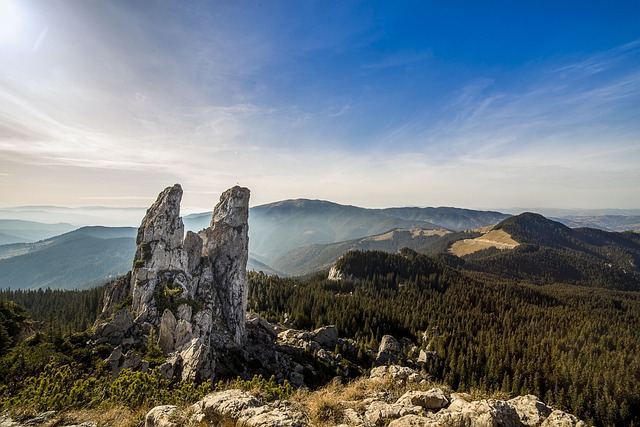
Romania, a beautiful country located in southeastern Europe, has become a popular destination for many digital nomads due to its rich history, stunning natural beauty, and low cost of living. In order to attract more remote workers and freelancers, Romania has launched a digital nomad visa policy. This article will provide a detailed introduction to Romania’s digital nomad visa, including application requirements, cost of living, cultural adaptation, etc.
1. What is the Romanian Digital Nomad Visa?
Romania’s Digital Nomad Visa is a residence permit designed for remote workers, freelancers and employees working for companies abroad. It allows visa holders to legally live in Romania and work online, taking full advantage of Romania’s unique advantages and enjoying European life while maintaining their own remote work. Here are a few key details about this visa:
Applicable objects
- remote worker: Including freelancers, online creators, programmers, designers, etc., all people who can work through the Internet.
- multinational company employees: Employees who work for overseas companies but do not need to come to the office.
- Business owners and entrepreneurs: Can be an independent business owner running an online business.
Visa advantages
- High flexibility: Compared with work visas in many other European countries, Romania’s digital nomad visa has fewer requirements on applicants’ work location, working hours, etc. Visa holders can work anywhere in the world while enjoying life in Romania.
- Suitable for long term living: Unlike the short-term tourist visa, the digital nomad visa allows applicants to stay for a long period of time with the opportunity to renew, making it suitable for remote workers who want to stay longer and immerse themselves in Romanian culture.
- European life experience: Romania, as an important country in Eastern Europe, has a strong historical and cultural background. From the modern city of Bucharest to the ancient castles of Transylvania, Romania offers a wealth of tourism and cultural activities. In addition, Romania’s natural beauty, such as hiking trails in the Carpathian Mountains and seaside resorts on the Black Sea, are great places for digital nomads to relax.
policy attractiveness
- lower cost of living: The cost of living in Romania is relatively low compared to Western European countries. Accommodation, food, transportation and other expenses can be kept at a relatively economical level in most cities in Romania, which is especially suitable for digital nomads with limited budgets.
- Simplified visa application process: The application process for the Romanian Digital Nomad Visa is relatively simple. Applicants do not need to provide cumbersome proof of employment or company registration documents. They only need to prove that they have enough income to support their life in Romania.
- Convenient for multiple entries and exits: This visa generally allows the holder to enter and exit Romania multiple times within the validity period of the visa, providing great convenience for cross-border work.
A living environment tailored for digital nomads
- work-life balance: Romania’s urban life and natural landscape provide a good working environment. High-speed internet and modern coworking spaces in cities make remote working more convenient, while Romania’s natural attractions provide ideal retreats for digital nomads who need to relax and recharge.
- Cultural and social opportunities: Romania has rich historical heritage and diverse cultural activities. Digital nomads can enjoy work while participating in local cultural festivals, concerts, museums and other activities to expand their social circle and cultural horizons.
Lifestyle suitable for visa
- freedom and flexibility: For remote workers seeking freedom, the Romanian Digital Nomad Visa provides an ideal platform. Whether through self-managed projects or providing remote services to global enterprises, digital nomads can enjoy a high degree of work autonomy here.
- EU bridge: Romania is an EU member state, and digital nomads holding this visa can enjoy the security, welfare and some cross-border conveniences of the EU, providing more possibilities for digital nomads who want to work in other European countries.
2. Application conditions and procedures
The conditions for applying for a Romanian digital nomad visa are relatively simple, but applicants still need to meet some basic requirements. The following are the detailed conditions and application process:
Application conditions
- income requirements
Applicants need to prove that they have sufficient income to support themselves in Romania. The exact amount of this requirement may vary depending on individual circumstances and is typically assessed based on household size, cost of living and income levels in the applicant’s industry. Generally speaking, applicants need to prove that their monthly income is no less than€2,500(approximately12,500 Romanian lei). For family applications, if a spouse or children are traveling, the income requirements will increase, usually by a certain percentage of the income standard for each family member. In addition, if you are a company employee, you may need to provide materials such as salary slips or bank deposit certificates to prove your income. - Nature of work
Applicants will need to provide documentation proving they are working remotely. These files can include but are not limited to:- A work contract or service agreement with a client;
- Freelance project contracts or payment records;
- An official confirmation letter from the employer that the applicant is a remote employee of his company and is able to legally work remotely in Romania.
- These documents must clearly show that the applicant is engaged in online work, not a job that requires a fixed location, and that the income from these jobs is derived from abroad.
- No criminal record
Applicants must provide a criminal record certificate proving that they have not been involved in any criminal conduct in the past. This certificate usually comes from the relevant government agency where the applicant lives, and the applicant may be required to provide a background check report from the country of origin. The processing time and requirements for background check reports vary from country to country, so it is recommended that applicants consult and handle this requirement in advance when preparing materials. - health insurance
Applicants must have valid health insurance while obtaining a digital nomad visa. This health insurance needs to cover medical expenses while in Romania and meet the minimum standards set by Romanian law. The insurance must cover basic medical protection such as routine medical treatment, emergency medical treatment, and hospitalization to ensure that applicants can receive adequate medical services in the event of health problems. - Valid passport
Applicants need to provide a passport valid for at least six months. If your passport is not valid enough, you may need to apply for an extension first. The passport must be a legal proof of identity from the holder’s home country or region, and must not have a blank page for the visa to be affixed.
Application process
- Prepare documents
Applicants need to ensure that all required documents are complete and in compliance with the requirements. Documents prepared typically include, but are not limited to:- Personal passport and its copy;
- Financial supporting documents, such as bank deposit certificates, tax returns or employer confirmation letters, etc.;
- Documentation proving remote work, such as a contract, work email, or letter from your employer;
- Certificate of no criminal record;
- Proof of purchased health insurance.
- Submit application
Applicants can choose to submit their application through a Romanian embassy or consulate abroad or through the online application system. Generally, Romanian embassies and consulates abroad accept paper applications submitted by mail or in person, although specific requirements vary depending on the embassy or consulate in the applicant’s country. Additionally, in some cases, applicants can apply online through the official website of the Romanian Immigration Service and submit documents by email. - Review and processing time
After submitting the application, the Romanian Immigration Service will review the materials submitted by the applicant, which usually requiresweeks time. Depending on the applicant’s situation, the Immigration Bureau may require additional materials or arrange further verification procedures such as interviews. In order to avoid delays due to incomplete documents or problems during the review process, applicants should ensure that all required materials are prepared in advance and verified in detail. - Visa approval and collection
Once the visa is approved, the applicant will receive an email or notification from the embassy or consulate, usually with instructions to collect the visa. Visas can be collected by mail or directly at the embassy or consulate. After the visa is approved, the visa holder can enter Romania according to the visa type and start his remote working life.
3. Visa validity and renewal
Digital nomad visas in Romania are usually first issued forone year validity period. During this year, visa holders can freely live and work remotely in Romania and enjoy legal residence and work benefits. During this time, the holder can experience the Romanian lifestyle and culture in depth while maintaining a work arrangement with a client or employer.
Visa validity period:
- Initial validity period: The initial validity period for a digital nomad visa is usually12 months. During this time, the holder does not need to leave Romania to continue working cross-border or freelance. During this period, holders will not be forced to enter any Romanian local labor market, and work will be performed entirely remotely.
- Live and work freely: During the validity period of the visa, the holder can move freely within Romania and live in any city or region. This provides more flexibility for digital nomads who want to dive deeper into life in Romania, especially for those who plan to live for an extended period of time or move between cities.
Renewal conditions:
When the digital nomad visa is about to expire, if the holder wants to continue to live and work, they can applyRenew. The renewal process is relatively simple, but some necessary supporting documents need to be submitted to ensure that the applicant meets the conditions for continued residence. The following are the main materials and conditions required for renewal:
- Proof of continuous income
When renewing their visa, applicants will need to provide their latest proof of income to prove that they still have sufficient funds to support their lives in Romania. Bank statements, pay stubs from your employer, or freelance contracts from the last few months are usually required to prove continuity of income. The income requirements are roughly the same as when you first applied, usually no less than€2,500(approximately12,500 Romanian lei)per month. - No criminal record certificate
Renewal applicants also need to submitNo criminal record certificate, this usually comes from the police or relevant government agency where you live. This certificate can usually be provided without any problems if you have not been involved in any illegal activities while in Romania. - Valid health insurance
To ensure continued health coverage during the renewal process, applicants must provideProof of valid health insurance. This insurance must cover all medical expenses while in Romania and comply with the requirements of Romanian law. - Updated profiles and files
When applying for renewal, applicants will also need to update some personal information, such as a copy of their passport, latest proof of address (such as a rental contract or letter from the landlord), and other documents that may be required.
Renewal procedure:
- Prepare in advance
Applicants should apply before the visa expiresat least one month Start preparing the documents required for renewal well in advance. Preparation in advance can help ensure that the renewal process goes smoothly and avoid delays caused by documentation issues. - Submit renewal application
Renewal applications can usually be made throughOnline application system Or go directly toimmigration office submit. Most materials can be submitted electronically, and applicants from some countries can also submit them through Romanian embassies and consulates abroad. - processing time
Review times for renewals are usually shorter, usuallyweeks, but may vary depending on the applicant’s specific circumstances or the complexity of the materials. During this period, applicants need to keep their contact information open and be ready to provide supplementary materials at any time. - Continue to reside after approval
Once the renewal is approved, the applicant can continue to live and work in Romania. Each renewal is usually valid for1 year, and the holder will not be required to leave the country during the visa cycle.
What to do after your visa expires:
- Departure after expiration: If the visa renewal is not applied for in time after the visa expires, the applicant needs to leave Romania before the visa expires. If you continue to stay in Romania after your visa expires, you may face fines or other legal consequences.
- Reapply: If the renewal is missed for some reason, the holder can choose to reapply for the visa, but may need to re-submit all materials and go through a new approval process. Specific requirements may vary depending on individual circumstances.
4. Cost of living
The cost of living in Romania is relatively low compared to Western European countries, attracting a large number of digital nomads who want to enjoy a high quality of life on a budget. Below are some key living expenses details to help applicants better plan their daily expenses in Romania.
stay
- Bucharest: As the capital city, the cost of living in Bucharest is slightly higher, but accommodation is still cheaper than in larger cities in Western Europe. Monthly rent for a one-bedroom apartment in the city center is500 to 700 euros between. Rents will be lower in suburban areas or communities farther from the center, usually in300 to 500 euros between.
- other big cities: In places such as Cluj-Napoca, Timisoara and Iasi, rents are also relatively reasonable. The rent for a one-bedroom apartment in the city center is approximately400 to 600 euros, suburban areas are in300 to 400 euros. The living environment in these cities is quieter and suitable for long-term living.
- Small towns and rural areas: In smaller towns or rural areas, rents are even lower and a one-bedroom apartment can cost as little as200 to 300 euros. These places have a slower pace of life and lower prices, making them suitable for digital nomads who prefer a peaceful environment.
food
- Daily groceries: Supermarkets and markets in Romania offer a wide variety of food at affordable prices. For example, one person’s monthly grocery expenses are approximately150 to 300 euros Including fresh vegetables, fruits, meat, dairy products, etc. If you prefer to cook at home, you can save part of your budget. Usually 30-50 euros per week can meet basic food needs.
- Dining out: The cost of eating out is relatively reasonable. A simple meal in an average restaurant would cost approx.10 euros, while a dinner for two at a more upscale restaurant is approx.30 to 50 euros. There are also many fast food options. A simple meal or street snack is available at about5 euros about.
- Coffee and drinks: Enjoying a cup of coffee in a Romanian cafe costs approx.2 euros, while an alcoholic beverage such as beer or wine is3 to 5 euros Between, this is quite affordable for digital nomads who often work outside the home.
transportation
- public transportation: Romania’s public transportation system is relatively complete, especially in large cities such as Bucharest, Cluj-Napoca and other places. One-way fare is approx.0.5 to 1 euro, while the monthly ticket price is usually around15 to 30 euros Perfect for digital nomads who commute every day. In addition, many cities offer discounted annual passes, further reducing transportation costs.
- Taxis and ride-hailing services: Taxi starting fare is low, approx.1 euro, and the cost per kilometer is0.5 euro about. Online ride-hailing services (such as Uber and Bolt) are also quite common and are very convenient for digital nomads who travel temporarily. Short journeys within the city usually cost betweenWithin 5 euros。
- car rental cost: Renting a car is also an option for digital nomads looking to explore all over Romania. The average daily cost of renting a car is20 euros or so, but with the addition of fuel, insurance, etc., the daily cost may increase to30 to 40 euros. Some car rental companies offer monthly rental discounts, which is very suitable for people who rent vehicles for long periods of time.
- Bicycle and electric scooter rental: Many major cities offer bicycle and electric scooter rentals, suitable for digital nomads traveling short distances. The cost for a single rental is typically hourly1 to 2 euros, while the monthly or annual cards are relatively cheap.
Other living expenses
- Internet and mobile phone charges: Internet in Romania is fast and affordable, with high-speed broadband costing approximately10 to 15 euros. Mobile phone plans include sufficient data and talk time, and the monthly fee is approximately5 to 10 euros, perfect for remote workers.
- entertainment activities: Romania has a wealth of cultural and entertainment options, such as visits to museums, cinemas, theaters and local concerts. Ticket prices are usually5 to 15 euros, while some attractions and museums offer discounts to students and specific groups of people.
5. Cultural adaptation and daily life
Romania’s living environment is not only rich in history and culture, but is also popular for its rich natural resources and welcoming community atmosphere. Here are some of the main highlights and details of adapting to Romanian culture and daily life as a digital nomad.
Cultural events and historical exploration
- Art and Museums: Bucharest has a large number of modern and traditional art museums, such as the National Gallery, the Romanian Peasant Museum, etc., which regularly exhibit various art works. From modern art to traditional crafts, the city’s museums and galleries offer digital nomads a wealth of opportunities for cultural experiences.
- music and drama: Romania is famous for its long musical tradition. It holds many music festivals and theater performances every year, including the Bucharest International Theater Festival, the Enscu International Music Festival, etc. These events attract many domestic and foreign tourists and are the best way to experience the Romanian cultural atmosphere. Ideal place.
- Castles and natural attractions: The Transylvania region is famous for its well-preserved ancient castles and the legendary story of Dracula. Historical sites such as Brown Castle and Peleş Castle make people feel like they have traveled back in time. In addition, the mountains and forests surrounding Transylvania are ideal for hiking.
Language and resident interaction
- language use: Although Romanian is the official language, English is more popular in big cities and tourist areas, especially among young people and in the service industry. In daily life, shops, restaurants and many public places have English signs, simplifying the daily communication needs of digital nomads.
- Social and Etiquette: Romanian people are generally friendly and sincere. When meeting for the first time, they will have appropriate etiquette greetings, such as shaking hands and smiling. Romanian residents show a curious and friendly attitude towards foreigners, and digital nomads can easily make local friends in their daily lives. In addition, the local “neighborhood culture” is relatively warm, and you can often feel a harmonious and harmonious atmosphere in the community.
Climate and outdoor activities
- climate with four distinct seasons: Romania has a mild climate, with cool and pleasant spring and autumn, warm summers and moderate snowfall in winter. Summer temperatures in Bucharest and other lowland areas range from 20-30°C, while winter temperatures fluctuate around freezing. For those who are accustomed to a climate with four distinct seasons, this is a comfortable place to live.
- Outdoor sports and nature reserves: Romania’s natural beauty is stunning, with stunning views of the Carpathian Mountains and an ideal place for outdoor activities such as hiking, camping and skiing. The famous Rhodope Mountains and Butchigi Mountains have abundant hiking routes and ski resorts, suitable for all types of outdoor sports enthusiasts.
- Cycling and water sports: The ecotourism area along the Danube River offers a wealth of water activities such as cycling, boating and fishing, and many national parks and nature reserves offer endless scenery, suitable for year-round exploration. For digital nomads who enjoy outdoor adventures, Romania’s geographical diversity means there’s always something new to experience.
Convenience in daily life
- Shopping and dining: There are many supermarkets, markets and shopping malls in Romanian cities, offering a wide selection of products, including local specialty foods and international brands. Many neighborhoods also have regular farmers’ markets offering fresh vegetables, fruits and artisanal products. In addition, Romania has a large number of restaurants, cafes and food courts covering traditional Romanian cuisine and international cuisine, so digital nomads can enjoy a variety of choices from traditional to international tastes.
- Public facilities and services: Romania’s urban infrastructure is complete, providing high-speed Internet, high-quality medical facilities, convenient banking services, etc., ensuring the convenience of life for digital nomads. Coworking spaces are also common in large cities, providing flexible work environments for remote working.
6. Comparison with other European countries
Romania’s digital nomad visa policy has obvious advantages in many aspects. In particular, compared with Western and Nordic countries, the application conditions are relatively loose and the cost of living is lower, making it particularly attractive to budget-conscious digital nomads. Here’s how Romania compares to other European countries launching digital nomad visas:
Flexibility in application conditions
- Lower income requirements: Compared to Portugal and Estonia, Romania’s minimum monthly income requirement is approximately €2,500 (approximately 12,500 Romanian lei). This amount is lower than Portugal’s 3,000 euros and Estonia’s 3,504 euros, and is suitable for digital nomads whose income level is not too high but who want to enjoy European life. Additionally, Romania’s family income requirements are relatively reasonable for applicants who want to bring dependents or families, making it more family-friendly.
- Visa policy laxity: Many European countries’ digital nomad visa policies tend to have strict occupation or industry restrictions, such as the need to work in a specific field, while Romania has less restrictive occupation scope for remote workers, as long as the applicant can prove their source of income and stability , industry types are generally unrestricted, making Romania more popular among freelancers and multi-industry remote workers.
Economic Advantages of Cost of Living
- Accommodation costs are lower: Compared with large cities in Western Europe, rents in Bucharest, the capital of Romania, and other large cities are significantly lower. The monthly rent for a studio apartment in the center of Bucharest ranges from 300 to 700 euros, while the rent for the same apartment in Lisbon, Portugal, often exceeds 800 euros. Monthly rent in Tallinn, the capital of Estonia, is also usually above 600 euros. For those looking to reduce fixed expenses, rent in Romania is one of the attractions.
- Cheap dining and living expenses: In Romania, daily food and dining costs are relatively reasonable. A meal out will cost around 10 euros, whereas in Portugal and Estonia similar meals can cost upwards of 15 euros. In addition, the price level in Romania is generally low, and daily necessities and local ingredients in supermarkets are relatively cheap, making it more suitable for long-term living.
Public transport and daily travel costs
- Transportation costs are lower: Public transport fares in Romania are very reasonable, with a monthly pass in Bucharest costing about 15 to 30 euros, which is cheaper than in many Western European countries. A monthly pass in Estonia costs around 40 euros, while in Portugal it can even cost more than 50 euros. For digital nomads traveling in Europe, Romania’s low transportation costs ease daily expenses.
- Convenient travel conditions: Romania is located in Eastern Europe, adjacent to the Balkan Peninsula and other countries in Central Europe, making it suitable for digital nomads to take short trips after work. Romania also offers more flexibility for travel to non-Schengen visa holders compared to Schengen Area countries, allowing digital nomads to have more international travel opportunities here without having to be subject to the 90-day stay limit of a Schengen visa. .
Cultural experience and diversity
- A cultural environment where tradition and modernity blend: Romania combines the diverse cultures of Eastern Europe and the Balkans. Compared with countries such as Portugal and Estonia, Romania has a unique historical charm and exotic color. It combines the medieval charm of Transylvania with the modern facilities of Bucharest, providing a rich living and cultural experience. In contrast, Portugal’s cultural atmosphere is more Western European, while Estonia is unique due to its Nordic characteristics and high degree of digitalization. Romania’s cultural appeal is particularly suitable for digital nomads looking to explore non-Western European traditions.
- Language adaptability and friendliness: Although Romanian is the official language, English is more widely spoken in large cities and tourist areas, especially among young people and those working in the service industry. In contrast, Portuguese is predominantly spoken in many parts of Portugal, while in Estonia, although English is common among young people, some areas still prefer the local language.
in conclusion
Romania’s digital nomad visa provides an ideal platform for global remote workers and freelancers. With flexible policies, low cost of living, rich cultural experiences and convenient location, this visa policy attracts a large number of digital nomads to come and explore. Whether you want to live in Europe, expand your career opportunities, or achieve a work-life balance amid laid-back nature, Romania offers a suitable option. For digital nomads looking for freedom and a stable working environment, Romania is not only a cost-effective place to live, but also a home where they can live long-term and integrate into the local culture.
